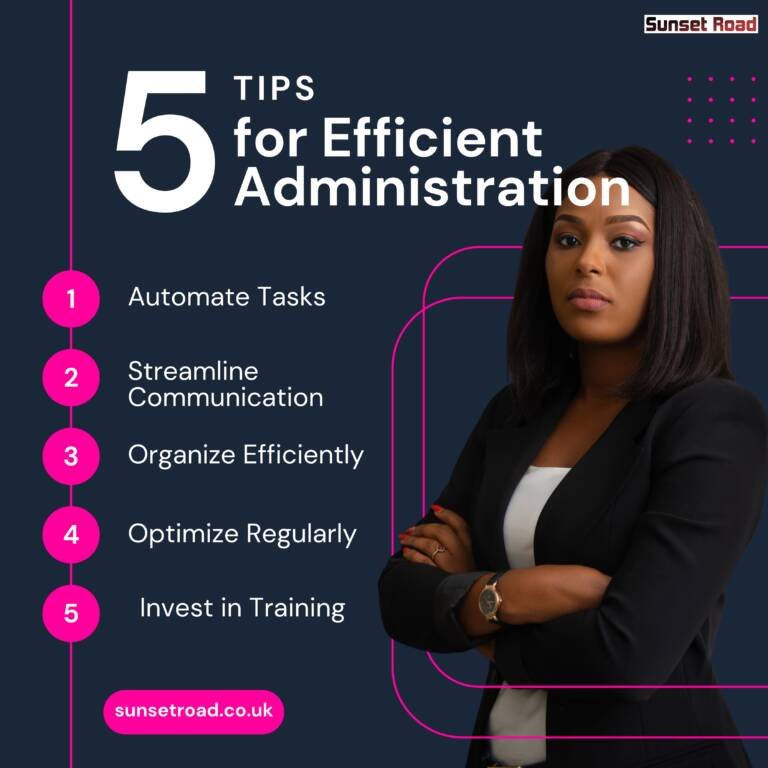Strategies for Enhancing Efficiency and Productivity
In today’s fast-paced and ever-evolving business environment, the importance of efficient and productive administration cannot be overstated. Administration forms the backbone of any organization, ensuring that operations are conducted smoothly, resources are optimized, and objectives are achieved on time. For UK businesses, where the market is competitive and regulatory landscapes are stringent, mastering administrative efficiency is crucial. This blog will delve into key strategies that can help organizations in the UK enhance efficiency and productivity within their administrative functions.
1. Streamline Processes through Technology
The digital transformation has brought about significant changes in the way businesses operate, and administration is no exception. The integration of technology into administrative processes has enabled organisations to automate routine tasks, reduce errors, and save valuable time, allowing staff to focus on more strategic activities.
Implementing Task Management Tools: Task management platforms like Trello, Asana, or Microsoft Planner have become indispensable in modern administrative processes. These tools allow administrators to create task lists, set deadlines, and track progress in real time. The visualisation features of these tools, such as boards and charts, make it easier to manage workloads and ensure that all team members are aligned with the company’s objectives. For UK businesses, where remote and hybrid working models are increasingly common, such tools are particularly beneficial in ensuring continuity and collaboration.
Automating Routine Tasks: Automation is a powerful tool for enhancing administrative efficiency. Using software like Zapier or Microsoft Power Automate, organisations can automate repetitive tasks such as data entry, email distribution, and report generation. For instance, routine emails, such as meeting reminders or follow-ups, can be automated, freeing up time for employees to focus on more complex tasks. In sectors like finance and healthcare, where accuracy is paramount, automation can also help reduce human error, ensuring compliance with UK regulations.
Digital Document Management: Moving away from paper-based processes to digital document management systems (DMS) can greatly enhance efficiency. Systems like SharePoint or Google Drive allow for secure storage, easy retrieval, and sharing of documents across the organisation. This not only reduces the physical space required for storage but also ensures that documents are easily accessible when needed, improving response times and decision-making.
2. Foster a Culture of Continuous Improvement
Continuous improvement is a philosophy that focuses on the ongoing effort to improve products, services, or processes. For administrative functions, this approach can lead to significant enhancements in efficiency and productivity.
Regular Process Reviews: To ensure that administrative processes remain efficient and relevant, it’s important to conduct regular reviews. These reviews can help identify bottlenecks, inefficiencies, or outdated practices that may be hindering productivity. Involving employees in these reviews can provide valuable insights, as they are often the best placed to identify practical issues and suggest improvements. For UK businesses, where regulatory requirements can frequently change, regular reviews also ensure that processes remain compliant.
Training and Development: Continuous improvement isn’t just about processes; it’s also about people. Investing in the ongoing training and development of administrative staff ensures they are equipped with the latest skills and knowledge to perform their roles effectively. This could include training on new software, soft skills development, or regulatory updates. In the UK, where the job market is competitive, providing development opportunities can also help with employee retention, as staff are more likely to stay with an organisation that invests in their growth.
Encouraging Innovation: Encouraging a culture of innovation within the administrative team can lead to creative solutions to everyday challenges. This could involve brainstorming sessions, innovation workshops, or even incentive schemes to reward employees who suggest and implement efficiency improvements. By fostering an environment where employees feel empowered to contribute ideas, UK businesses can tap into a wealth of potential improvements.
3. Optimise Resource Allocation

Optimising the allocation of resources is essential for ensuring that all aspects of the business function at their best. This involves not only the effective use of physical resources but also the optimal utilisation of time and human capital.
Time Management Techniques: Efficient time management is a cornerstone of productivity. Techniques such as the Pomodoro Technique, which involves working in focused intervals with short breaks in between, can help employees stay focused and avoid burnout. Time blocking, where specific periods are allocated for different tasks, can also be effective in ensuring that important tasks are prioritised and completed on time. For UK businesses, where the cost of labour is relatively high, optimising time management can lead to significant cost savings.
Smart Staffing: Effective staffing involves analysing workloads and assigning tasks based on employees’ strengths, availability, and expertise. This ensures that tasks are completed efficiently and that no single individual or department is overwhelmed. Cross-training staff so that they can handle multiple responsibilities can also help in managing peak periods or covering for absences. In the UK, where employee well-being is increasingly recognised as a key factor in productivity, smart staffing can help prevent burnout and improve job satisfaction.
Resource Planning Tools: Implementing resource planning tools can help in the effective allocation of both human and material resources. Software like Resource Guru or Monday.com allows for the tracking of resource availability, workload distribution, and project timelines. This helps in avoiding over-allocation or under-utilisation of resources, ensuring that projects are completed on time and within budget.
4. Leverage Data for Informed Decision-Making

Data-driven decision-making is crucial for enhancing administrative efficiency. By collecting and analysing relevant data, businesses can make informed decisions that align with their strategic goals and drive continuous improvement.
Use of Analytics Tools: Analytics tools like Google Analytics, Power BI, or Tableau are invaluable in providing insights into operational performance. These tools allow businesses to track key metrics, identify trends, and make data-driven decisions. For instance, analysing data on task completion times, employee productivity, or customer service response times can help identify areas where processes can be streamlined. For UK businesses, where compliance and efficiency are often interlinked, analytics can also help ensure that administrative processes are both effective and compliant.
Setting Key Performance Indicators (KPIs): KPIs are essential for measuring the success of administrative processes. These could include metrics such as the time taken to complete tasks, error rates, or customer satisfaction levels. By setting and regularly monitoring KPIs, businesses can ensure that their administrative processes are aligned with their efficiency goals. In the UK, where businesses are often required to report on various performance metrics, having clear KPIs can also simplify reporting and ensure transparency.
Data Security and Compliance: In the UK, where data protection regulations such as the General Data Protection Regulation (GDPR) are stringent, ensuring the security and compliance of data-driven processes is paramount. This includes implementing robust data security measures, regularly updating software, and providing training to staff on data protection best practices. By prioritising data security, businesses can avoid costly breaches and maintain the trust of their customers.
5. Enhance Communication and Collaboration
Effective communication and collaboration are critical to the success of any administrative function. Ensuring that all team members are on the same page helps prevent misunderstandings, reduces delays, and fosters a collaborative working environment.
Implementing Unified Communication Platforms: Unified communication platforms like Microsoft Teams or Slack have revolutionised the way teams communicate and collaborate. These platforms allow for instant messaging, file sharing, and video conferencing, all in one place. This not only improves communication but also ensures that information is easily accessible when needed. For UK businesses, where remote and hybrid working models are becoming more common, these platforms are essential for maintaining effective communication and collaboration.
Regular Meetings and Updates: Scheduling regular check-ins and update meetings is important for keeping everyone informed and aligned with the organisation’s goals. These meetings provide an opportunity to discuss progress, address any issues, and adjust plans as necessary. For UK businesses, where decision-making often involves multiple stakeholders, regular meetings ensure that everyone is on the same page and that decisions are made promptly.
Collaboration Tools: In addition to communication platforms, collaboration tools such as Google Workspace or Office 365 can enhance productivity by allowing teams to work together on documents, spreadsheets, and presentations in real time. These tools facilitate seamless collaboration, even when team members are working remotely, and ensure that everyone has access to the most up-to-date information.
6. Prioritise Employee Well-being
A productive administration is one where employees feel valued, supported, and motivated. Prioritising employee well-being can lead to higher levels of engagement, reduced absenteeism, and ultimately, improved productivity.
Work-Life Balance Initiatives: Promoting a healthy work-life balance is essential for maintaining employee well-being. This could include offering flexible working arrangements, encouraging the use of annual leave, and providing support for mental health and well-being. For UK businesses, where employee well-being is increasingly recognised as a key factor in productivity, these initiatives can lead to higher levels of job satisfaction and lower turnover rates.
Recognition and Reward Systems: Recognising and rewarding employees for their contributions to administrative efficiency is important for maintaining motivation and morale. This could include formal recognition programs, performance bonuses, or simply verbal acknowledgment. A motivated workforce is more likely to go the extra mile to improve productivity and contribute to the organisation’s success.
Health and Wellness Programs: Implementing health and wellness programs can also enhance employee well-being and productivity. This could include offering gym memberships, organising wellness workshops, or providing healthy snacks in the workplace. For UK businesses, where employee health is closely linked to productivity, these programs can lead to a healthier, more engaged workforce.
7. Implement Agile Administrative Practices
Agile methodologies, which focus on adaptability, collaboration, and continuous improvement, can be applied to administrative functions to enhance efficiency and productivity.
Agile Planning and Execution: Agile planning involves breaking down larger administrative projects into smaller, manageable tasks. These tasks are then completed in short iterations or sprints, allowing for regular assessment and adjustment as needed. This approach ensures that projects remain on track and that any issues are addressed promptly
Conclusion
Enhancing efficiency and productivity in administration is not just about implementing the latest tools or following best practices—it’s about fostering a culture of continuous improvement and adaptability. For UK businesses, where the regulatory environment is complex and the market competitive, efficient administration can be the difference between success and stagnation. By streamlining processes through technology, fostering a culture of improvement, optimising resource allocation, leveraging data, enhancing communication, prioritising employee well-being, and adopting agile practices, organisations can build a resilient administrative function that not only supports day-to-day operations but also drives long-term growth and innovation. Ultimately, a well-managed administrative function empowers businesses to achieve their strategic goals, maintain compliance, and stay ahead in a dynamic business landscape.












